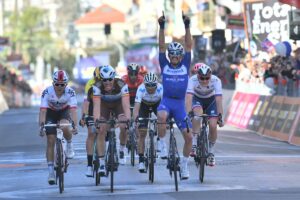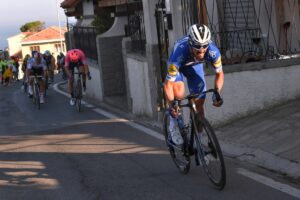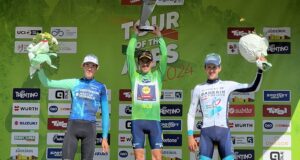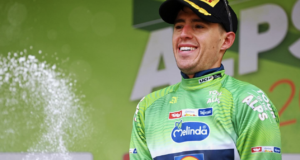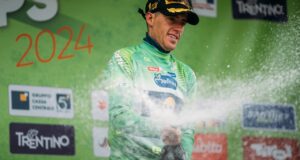Hace un año, abrumado por la emoción, un Julian Alaphilippe encantado, emocionado y exultante se detuvo por un segundo momento después de cruzar la línea de meta y contuvo el aliento, antes de soltar un gran rugido de alegría que sonó en los oídos de la bulliciosa multitud que se alineaba a ambos lados de la Via Roma.
El francés de 26 años cuenta ya en la historia como un ganador de un Monumento, después de 291 largos kilómetros condimentados por un final increíblemente emocionante, que lo vio coronar un excelente trabajo en equipo por Deceuninck Quick Step, siempre batallando en la parte delantera del pelotón desde el principio hasta el final para luchar por la victoria.
Originalmente, este sábado día 21 de marzo estaba programada la 111ª edición de La Classicissima, pero debido a la epidemia sufrida a consecuencia del contagio masivo por el coronavirus de Wuhan se ha cancelado gran parte del calendario UCI para 2020. Con la incertidumbre por si se volverá a disputar en este año la primera gran clásica de la primavera, recordamos aquel momento con el gran protagonista en aquel día.
Volvamos a la mañana del 23 de marzo de 2019. ¿Qué pensaste al comienzo de la carrera?
A decir verdad, estaba bastante relajado. Ok, hubo un poco de estrés, pero del tipo que tienes antes de cualquier carrera. Aparte de eso, tenía confianza y motivación, ya que sabía que iba a entrar en la carrera por encima de mi forma y rodeado de un equipo comprometido a ayudarme a lograr mi objetivo.
Como siempre con Milán-Sanremo, los últimos 40 kilómetros fueron los más nerviosos. ¿Sintió la tensión acumularse cuando el Poggio se acercó?
Era mi tercera vez en la carrera y lo que aprendí de las pasadas participaciones fue que es una carrera larga y hay que mantener la calma para el final, que siempre es explosivo. Las cosas se pusieron agitadas en el frente desde el Cipressa, pero mi increíble equipo me protegió en todo momento y se aseguró de estar en la mejor posición al comienzo del Poggio.
¿Qué tan importante fue poder confiar en un equipo tan bueno, que controlaba la carrera y empujaba un ritmo duro hasta el momento de su ataque?
Su espectacular carga de trabajo marcó la diferencia y me permitió evaluar a mis rivales en el Poggio, mientras mantuvieron el ritmo alto e impidieron cualquier movimiento hasta el momento en que sentí que sería el adecuado para atacar.
Su aceleración forzó una selección importante, solo un pequeño grupo llegó a la Via Roma. ¿Qué pasó por tu mente cuando parecía que se reduciría todo a un sprint reducido?
Cuando ataqué dentro del último kilómetro de la ascensión traté de hacer una diferencia y al mirar por encima del hombro, mientras subía a la cima, pude ver que solo quedaban un par de corredores pero todos eran rivales fuertes, grandes nombres. Entonces, en el descenso solo intenté recuperarme y mantenerme concentrado, sabiendo que tenía que hacer un sprint perfecto para obtener la victoria.
¿Ganar un sprint en Tirreno-Adriatico unos días antes de Sanremo le dio un impulso a su moral para este escenario?
Esa victoria auguró algo bueno. Al llegar a Milán-Sanremo sabía que estaba en buena forma, con un total de tres victorias italianas en Strade Bianche y Tirreno-Adriatico en mi haber, así que tengo que decir que tenía una confianza a prueba de balas cuando quedó claro que la victoria nos la jugábamos en un sprint.
Llévanos por esos últimos 200 metros.
La carrera fue a todo gas y muy difícil de controlar después del descenso. Todos se estaban mirando, esperando el sprint y convirtiendo el final en periodo táctico. La victoria nunca es tan simple como se ve desde el exterior y supe por la edición de 2017 que tienes que ser inteligente, mantener la calma y hacer un buen esfuerzo en el momento adecuado a medida que aumenta la adrenalina. Cuando Mohoric comenzó el sprint, lo seguí y cuando entramos en la recta final dejé de pensar y empujé tan fuerte como pude en los pedales.
Su palmarés cuenta con varias clásicos, etapas de Grandes Vueltas y carreras por etapas. ¿Dónde clasificas tu victoria de Milán-Sanremo?
Es realmente complicado elegir, porque todas estas victorias son todas especiales y todas significan algo para mí. Por otro lado, conseguir mi primer Monumento en Milán-Sanremo, la carrera más larga y quizás más difícil de leer del año, es algo que nunca olvidaré. Ese día, con la ayuda de un equipo excelente y sobresaliente del que estoy muy orgulloso, convertí mi sueño en realidad, por lo que puedo decir que es mi victoria más bonita hasta la fecha.
ENGLISH: Julian Alaphilippe. “Milano-Sanremo is my most beautiful win”
The fourth reigning Tour de France KOM champion in history to conquer “La Primavera” looked back on his perfect day on the Italian Riviera.
One year ago, overcome with emotion, a delighted, ecstatic, thrilled and exultant Julian Alaphilippe stopped for a second moments after crossing the finish line and caught his breath, before letting out a huge roar of joy that rang in the ears of the large and boisterous crowd that lined both sides of the Via Roma.
The 26-year-old Frenchman was now a Monument winner, after 291 long kilometers spiced up by an insanely exciting finale, that saw him cap off a superb teamwork of the Wolfpack, who patrolled the front of the peloton from the beginning and set him up for victory.
It was one of Julian’s and Deceuninck – Quick-Step’s highlights of another unforgettable season, so it was only right that ahead of this weekend, which had originally scheduled the 111th edition of La Primavera, we talk with the reigning champion about his memorable triumph at the season’s first Monument.
Julian, let’s go back to the morning of 23 March 2019. What were your thoughts at the start of the race?
To tell the truth, I was quite relaxed. Ok, there was a bit of stress, but the kind you have before any race. Other than that, I was confident and motivated, as I knew I was going into the race on the top of my shape and surrounded by a team committed to helping me achieve my objective.
As always with Milano-Sanremo, the final 40 kilometers were the most nervous. Did you feel the tension building up as the Poggio approached?
It was my third time in Milano-Sanremo and what I had learned from the past participations was that it’s a long race and you have to remain calm for the final, which is always explosive. Things became hectic at the front as early as the Cipressa, but I was protected at all times by my incredible team, who made sure I was in the best position at the start of the Poggio.
How important was it to be able to rely on such a great team, who controlled the race and pushed a hard tempo until the moment of your attack?
Their spectacular workload made the difference and allowed me to asses my rivals on the Poggio, while they kept the tempo high and prevented any moves until the moment I felt it was the right time to attack.
Your acceleration forced an important selection, only a small group arriving on the Via Roma. What went through your mind as it seemed that it will come down to a reduced sprint?
When I attacked inside the last kilometer of the climb, I tried to make a difference and looking over my shoulder as I crested the top, I could see that only a couple of riders were still left, but they were all strong guys, big names. So, on the downhill I just tried to recover and keep my focus, knowing I had to do a perfect sprint in order to take the victory.
Did winning a bunch sprint in Tirreno-Adriatico just a few days before Sanremo give your morale a boost for this scenario?
That victory augured well. Coming into Milano-Sanremo I knew I was in good shape, with a total of three Italian wins at Strade Bianche and Tirreno-Adriatico under my belt, so I’ve got to say I had a bulletproof confidence when it became clear the win will be played out in a sprint.
Take us through those last 200 meters.
The race was full gas and very difficult to control after the downhill. Everybody was looking at each other, waiting for the sprint and turning the final into a very tactical one. Victory is never as simple as it looks from the outside and I knew from the 2017 edition that you have to be smart, stay calm and do a good effort at the right moment as the adrenaline is going up. When Mohoric started the sprint, I followed him and when we entered the final straight, I stopped thinking and just pushed as hard as I could on the pedals.
Your palmares boasts several Classics, Grand Tour stages, and stage races. Where do you rank your Milano-Sanremo victory?
It’s really complicated to choose, because all these wins are all special and they all mean something to me. On the other hand, to take my first Monument at Milano-Sanremo – the longest and maybe most difficult to read race of the year – is something I will never forget. On that day, with the help of a superb and outstanding team of whom I am very proud, I turned my dream into reality, so I can say it’s my most beautiful victory to date.
 Ciclo21 Portal de ciclismo
Ciclo21 Portal de ciclismo
